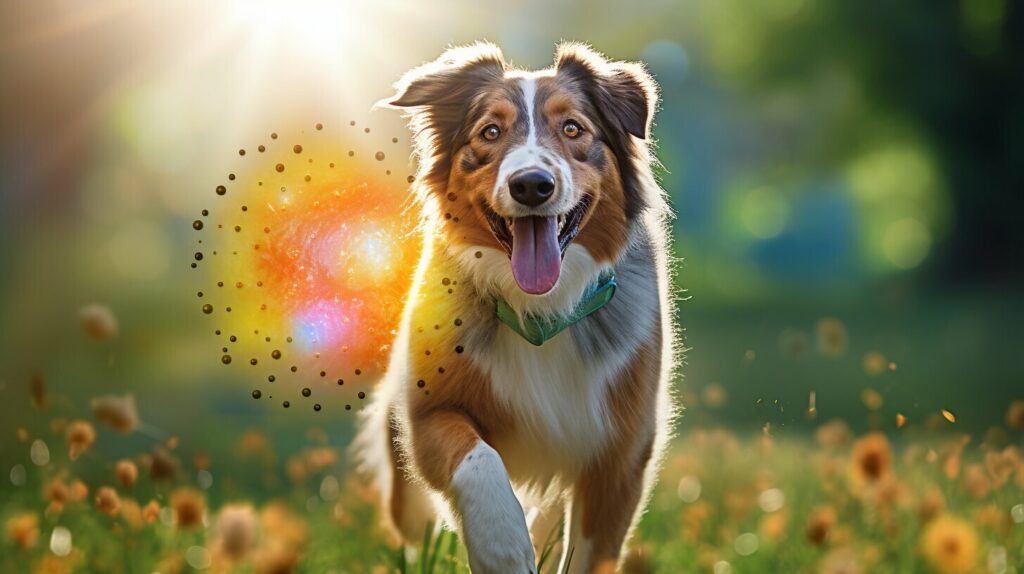As a responsible dog owner, it’s important to ensure your furry friend stays healthy and happy. One of the best ways you can do this is by getting them vaccinated. Vaccines for dogs are an essential part of their healthcare routine, as they protect against dangerous and potentially life-threatening diseases.
There are several types of vaccines available for dogs, each designed to prevent specific illnesses. From core vaccines that are essential for all dogs to non-core vaccines that are recommended based on your dog’s lifestyle and environment, getting your pup vaccinated is crucial to their well-being.
Key Takeaways:
- Vaccines for dogs are essential for maintaining their health and well-being.
- There are several types of vaccines available, including core and non-core vaccines.
- Getting your dog vaccinated can help prevent dangerous and potentially life-threatening diseases.
Understanding Vaccines for Dogs
Vaccinations are an essential part of your dog’s health and wellness. By giving your furry friend the right immunizations, you can help protect them from potentially deadly diseases. Here’s what you need to know about dog immunization, including puppy shots and pet vaccines.
How Do Vaccines Work?
A vaccine works by stimulating a dog’s immune system to produce antibodies against specific diseases. If the dog is ever exposed to the disease in the future, these antibodies will help prevent or minimize infection.
Why Are Vaccines Necessary?
Vaccines are necessary to protect your dog from a variety of diseases that can be both dangerous and potentially lethal. Many of these diseases, such as parvovirus and distemper, are highly contagious, meaning they can quickly spread to other dogs and animals in the community.
Types of Vaccines
There are two main types of vaccines: core vaccines and non-core vaccines.
| Core Vaccines | Non-Core Vaccines |
|---|---|
| Rabies | Bordetella |
| Distemper | Lyme Disease |
| Parvovirus | Influenza |
| Hepatitis | Leptospirosis |
Core vaccines are essential for all dogs, regardless of their lifestyle or environment. Non-core vaccines are recommended based on specific risks, such as exposure to ticks or contact with other dogs in a kennel or daycare setting.
Puppy Shots and Pet Vaccines
When it comes to puppy shots, it’s important to follow a recommended vaccine schedule to ensure your new furry friend is protected as soon as possible. Typically, puppies receive a series of vaccines between 6-8 weeks old and 16-20 weeks old. Adult dogs require booster shots to maintain their immunity. Your veterinarian will advise you on the best vaccination schedule for your dog.
By understanding the different types of vaccines available, you can help make informed decisions about the immunizations your dog needs to stay healthy. Consult with your veterinarian to develop a personalized vaccination plan for your furry friend.
Core Vaccines for Dogs: Essential Protection
Vaccines are an essential component of your dog’s healthcare routine, as they protect against a variety of diseases. Core vaccines are considered essential for all dogs, regardless of their lifestyle or environment. These vaccines offer protection against highly contagious and potentially fatal diseases that are easily spread among dogs.
| Vaccine | Disease |
|---|---|
| Rabies | Rabies virus |
| Distemper | Distemper virus |
| Parvovirus | Parvovirus |
| Hepatitis | Adenovirus type 2 |
Rabies is a particularly dangerous disease that can be transmitted to humans, making it even more important to ensure that your dog receives this vaccine. Distemper, parvovirus, and hepatitis are also highly contagious diseases that can be fatal without treatment, so vaccinating against them is vital for your dog’s health.
The frequency of core vaccinations varies depending on the vaccine and your location, but they typically require an initial set of shots followed by booster shots every 1-3 years. Most core vaccines have few side effects, but some dogs may experience mild discomfort or swelling at the injection site. It’s important to consult with your veterinarian about the appropriate vaccination schedule for your dog.
By ensuring that your dog receives core vaccinations, you not only protect their health but also contribute to the overall well-being of the dog community. Vaccines play a crucial role in preventing disease outbreaks and protecting other vulnerable animals in the community. As a responsible pet owner, it’s important to prioritize your dog’s health by staying up-to-date on their vaccinations.
Non-Core Vaccines: Additional Protection for Specific Risks
While core vaccines are essential for all dogs, non-core vaccines may be recommended based on specific risks. Your dog’s lifestyle, location, and exposure level are factors that may influence the need for these vaccinations. Here are some examples of non-core vaccines:
| Disease | Vaccine |
|---|---|
| Lyme Disease | Two-dose series, booster required annually |
| Influenza | Two-dose series, booster required annually |
| Bordetella (Kennel Cough) | Annual vaccine for high-risk dogs |
Consult with your veterinarian to determine if your dog needs any non-core vaccines. They can help assess the potential risks and benefits and make a personalized vaccination plan for your dog. Keep in mind, while non-core vaccines are not always necessary for every dog, they may provide additional protection against diseases and prevent the spread of illness to other dogs in your community.
Remember, vaccines are an important part of dog disease prevention. By staying up-to-date on your dog’s vaccinations, you can help keep them healthy and protect them from harmful illnesses.
Vaccination Process: What to Expect
Keeping your dog healthy involves more than just love and attention. Vaccinations are a critical part of your dog’s overall health and wellbeing. Puppy shots are just the beginning of a lifelong process that requires regular check-ups with your veterinarian.
The canine vaccine schedule typically starts when your puppy is around 6 to 8 weeks old, with booster shots given every 2-4 weeks until they are around 16 weeks old. After that, adult dogs typically require annual vaccinations to maintain immunity.
It’s important to follow the recommended schedule to ensure that your dog is protected against diseases. Your veterinarian can provide you with a personalized vaccination plan based on your dog’s individual needs and lifestyle.
During the vaccination process, your dog may experience mild discomfort or swelling at the injection site. This is a common reaction and typically subsides within a few hours to days. In rare cases, your dog may experience more serious side effects, such as an allergic reaction.
It’s important to monitor your dog’s behavior and well-being after vaccinations to ensure that they are not experiencing any adverse effects. If you notice anything unusual, don’t hesitate to contact your veterinarian for advice.
Choosing a Veterinarian for Vaccinations
When it comes to veterinary vaccinations, choosing the right veterinarian is crucial in ensuring your dog’s health. It’s essential to find a reputable and trustworthy veterinarian who has experience in administering vaccinations and is knowledgeable about the latest vaccine protocols.
Start by conducting research on potential veterinarians in your area. Consider factors such as their qualifications, years of experience, and reputation within the community. You can also ask for recommendations from friends, family, and other pet owners.
Once you have a list of potential veterinarians, schedule a consultation to get to know them better. During the consultation, ask about their vaccination protocols and their experience with administering vaccines to dogs. They should be able to provide you with a clear and concise explanation of their vaccine schedules and any potential side effects.
It’s also important to consider the overall atmosphere of the veterinary clinic. The clinic should be clean and well-maintained, with friendly and knowledgeable staff. Look for reviews online or ask for references to get a sense of other pet owners’ experiences.
Regular check-ups are crucial in ensuring that your dog stays up-to-date on their vaccinations. Your veterinarian should provide you with a vaccination schedule tailored to your dog’s specific needs and lifestyle. This schedule will include core vaccines, as well as any additional non-core vaccines recommended for your dog.
Lastly, ongoing communication with your veterinarian is essential in ensuring your dog’s overall health. Be sure to keep your veterinarian updated on any changes in your dog’s behavior or health, and schedule regular check-ups to discuss any vaccination updates or concerns.
Vaccine Safety and Side Effects
As with any medical treatment, there is always a small risk of side effects associated with dog vaccinations. However, the benefits of vaccination far outweigh the risks, and serious side effects are rare.
Some dogs may experience mild discomfort or swelling at the injection site, which usually subsides within a day or two. In rare cases, your dog may experience more severe reactions, such as vomiting, diarrhea, or lethargy. If you notice any of these symptoms after vaccination, contact your veterinarian immediately.
It’s essential to monitor your dog’s well-being after vaccination and keep an eye out for any unusual behavior or symptoms. Your veterinarian can provide guidance on what to look for and when to seek medical attention.
Overall, the safety of vaccines for dogs has been well established, and they are an essential tool in preventing the spread of disease and keeping your pet healthy.
The Benefits of Vaccines for Dogs and the Community
Getting your dog vaccinated not only protects them from diseases but also safeguards the entire community. Vaccinating your dog helps to prevent the spread of canine diseases, reducing the likelihood of outbreaks and ensuring a healthier environment for all.
Vaccines for dogs also play an important role in preventing zoonotic diseases, which can be transmitted from animals to humans. By vaccinating your dog, you help to reduce the risk of these diseases and protect the health and safety of your family and others in the community, especially those with weaker immune systems.
Canine vaccines also contribute to herd immunity, which means that if a high percentage of dogs in a community are vaccinated, the likelihood of a disease outbreak is significantly reduced. This is because vaccinated dogs act as a barrier, preventing diseases from spreading to unvaccinated dogs and other vulnerable animals.
Overall, vaccines for dogs are essential for maintaining their health and well-being, as well as protecting the health of the wider community. As a responsible pet owner, it is your duty to ensure that your dog is up-to-date with their vaccinations to help maintain a healthier and safer environment for all.
Conclusion
By now, you should understand the essential role that vaccinations play in keeping your dog healthy and safe. Vaccines protect your furry friend from a range of dangerous and potentially deadly diseases, and help to prevent the spread of these illnesses within the larger community.
Remember, the specific vaccination needs of your dog will depend on a variety of factors, including their lifestyle, location, and exposure to certain risks. Your veterinarian can help you to determine which vaccinations are essential for your pet’s health, and ensure that they receive the appropriate care.
As a responsible dog owner, it’s crucial that you prioritize your pet’s health and well-being by keeping up with their vaccination schedule. This not only protects your beloved pet, but also helps to safeguard the health of other animals in the community. So, be sure to consult with your veterinarian on your dog’s specific vaccination needs, and stay committed to keeping them happy, healthy, and safe for years to come.
FAQ
Q: What are the benefits of vaccinating my dog?
A: Vaccinating your dog helps protect them from potentially deadly diseases and prevents the spread of these diseases to other animals. It also contributes to the concept of herd immunity, which helps keep the entire community safe.
Q: How do vaccines for dogs work?
A: Dog vaccines work by stimulating the immune system to recognize and respond to specific disease-causing organisms. This prepares the immune system to fight off the real disease if your dog is ever exposed.
Q: Are there different types of dog vaccines?
A: Yes, there are different types of dog vaccines. The two main categories are core vaccines, which are essential for all dogs, and non-core vaccines, which are recommended based on specific risks and lifestyle factors.
Q: How often do dogs need core vaccinations?
A: Core vaccinations for dogs are typically administered on a schedule determined by your veterinarian. In general, puppies receive a series of vaccinations starting at around 6-8 weeks old, followed by boosters at specific intervals. Adult dogs may need booster shots every 1-3 years.
Q: Are there any potential side effects of dog vaccines?
A: While dog vaccines are generally safe, some dogs may experience mild side effects, such as temporary discomfort or swelling at the injection site. Serious side effects are rare but can occur. It’s important to monitor your dog after vaccination and consult your veterinarian if you have any concerns.



